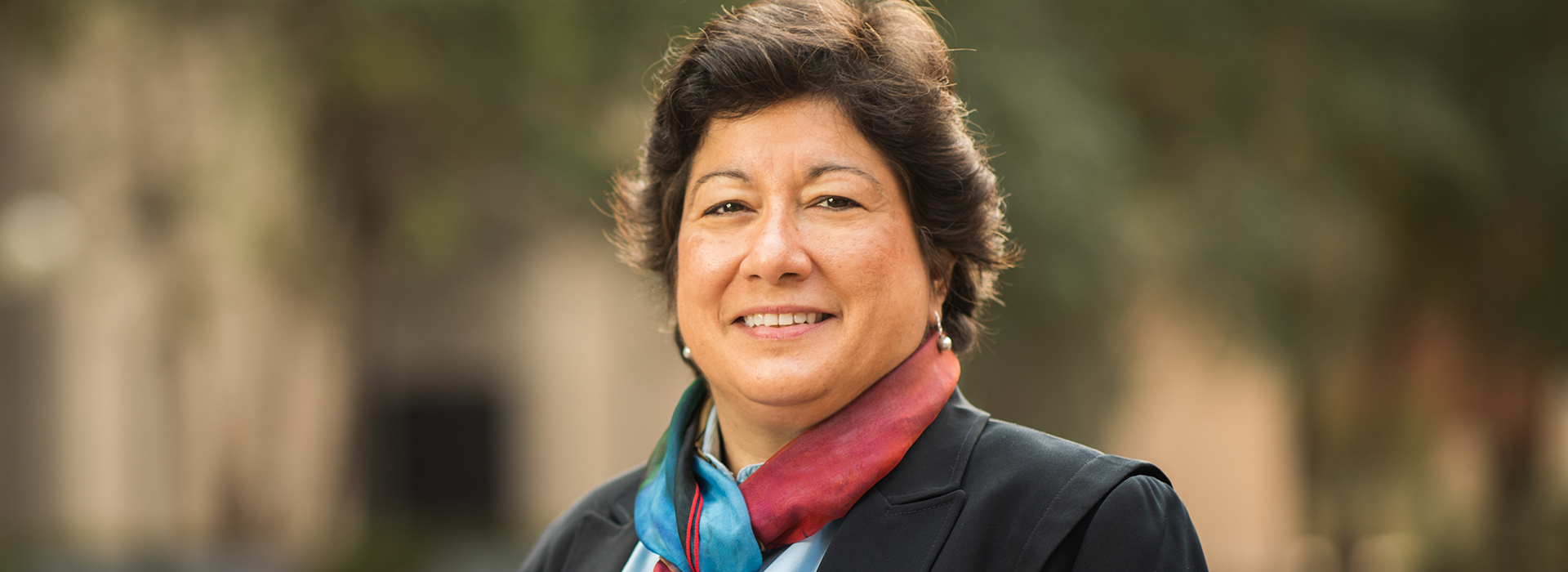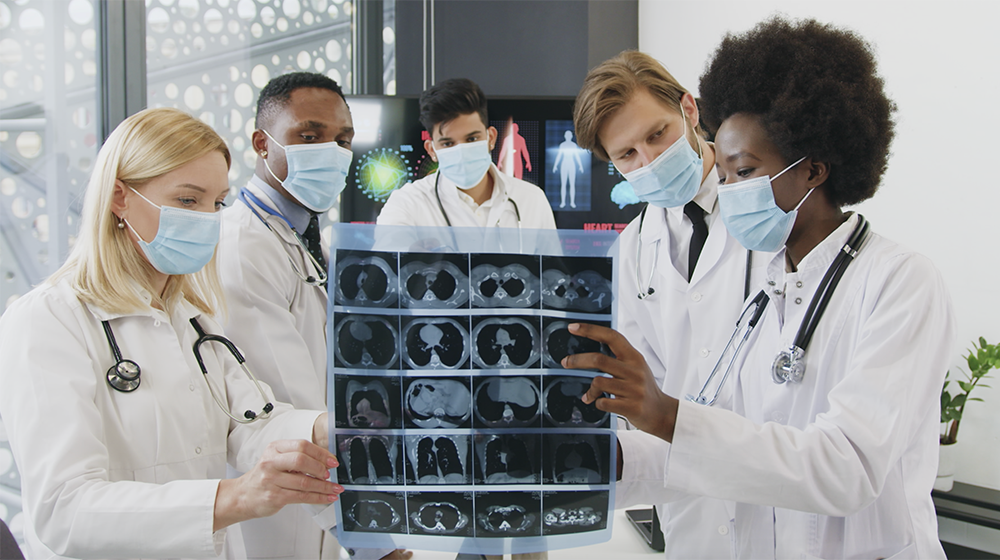
‘Collaborator-in-Chief’ — Meet the Inaugural Vice Dean of Diversity, Equity and Inclusion
‘Collaborator-in-Chief’
Meet the Inaugural Vice Dean of Diversity, Equity and Inclusion
Read time: 5 minutes
Between 600 to 700 — that’s the number of people Ana Núñez, MD, FACP, estimates meeting in her first few months as the inaugural vice dean for diversity, equity and inclusion (DEI) at the University of Minnesota Medical School.
“In Hollywood squares format, of course, but I’ve had the opportunity to meet with a lot of people,” she laughs, describing the very virtual nature of her work since late August. “I can’t actually say that I’ve gotten to meet everyone engaged or caring about the work because, as I go along, I hear about or find another amazing group."
These groups, according to Dr. Núñez, have been identified as exemplars in the realm of DEI work already in existence at the Medical School.
Each and every conversation has made it more clear for her — “I’m the collaborator-in-chief,” she says.
“Doing an appropriate and action-minded environmental scan is essential. I found that there’s a lot of great work already happening. A missing piece was having someone who could weave it all together. All DEI work starts with our missions — innovative research, excellence in education and training and patient care. Through this process, I’ve identified needs and areas of commonality. What’s good that, with a little bit of energy, could be great? Where are the gaps? And then, what do we need to troubleshoot to make sure we are staying linked to the mission? There is an astronomical amount of potential and a space with lots of talented, eager people ready to make change.”
Appreciating Similarities and Differences
It’s the numerous initiatives already underway, led by “smart, motivated and kind-hearted” members of the Medical School community, that Dr. Núñez says, ultimately, sealed her desire for the position back when the search began in the fall of 2019. But prior to her research into the job and the Twin Cities community, she admits she mislabeled her stereotype of the area.
“My only experience in Minneapolis was transferring in the airport from one airline to the next, and when I started looking into this position, I was really impressed by the diversity of the populations in the Twin Cities — Hmong, American Indian, Somali, Hispanic, African American. I had no idea,” she says.
Despite her limited exposure to Minnesota, Dr. Núñez brings a wealth of transferable skills from her home state of Pennsylvania. Nationally recognized as a medical education and health services researcher, she specializes in sex and gender medicine, primary care, trauma/violence prevention and cultural competence. Before arriving at the Medical School, she served as associate dean for diversity and inclusion in the College of Medicine at Drexel University and as director of Drexel's nationally designated Center of Excellence in Women's Health — one of three original centers.
Dr. Núñez says the Twin Cities soon felt familiar, realizing the expertise she had developed over the last 30 years applies directly to the wants and needs of her new community.
“Pennsylvania and Minnesota actually are more similar than dissimilar, having both urban and rural populations and a diverse set of complexions,” she says. “That, then, became very compelling in terms of addressing DEI in medicine and being able to make an impact — from research advances and education to patient care delivery. The potential I saw here was just immense.”
A Death that Changed the World
May 25, 2020 — for eight minutes and 46 seconds — the world watched George Floyd die in the heart of Minneapolis. While the deep hurt and trauma still lingers in the Twin Cities and much of the world today, Dr. Núñez remembers in late August — on day one of the job — the pressing responsibility she felt both personally and from her new colleagues to make immediate change.
“After George Floyd’s murder, the urgency of the good work that they were doing to make change really amped up, and I was impressed by that because there’s some places across the nation where his death was disruptive, and then they did a little lip-service and went back to doing things,” she says. “That wasn’t the case here. I saw the commitment to make change from top-down and bottom-up.”
And, they got to work. With their “collaborator-in-chief,” the Medical School began the journey of what Dr. Núñez calls “transformational change.” In her first few months, she helped:
-

Encourage each department to appoint diversity officers and met with senior leaders and department heads to identify common challenges and establish DEI priorities.
- Assume leadership of a lecture series, for all faculty, staff and learners in the Medical School, that discusses critical issues that are emerging during the pandemic and addresses racial injustice and health disparities efforts within the institution.
- Oversee the innovative Rapid Response Grants to Reduce Racial/Ethnic Disparities in Healthcare, which support research in the areas of mental health among people of all ages; COVID-19 testing and patient care; and other projects that are collaborative and informed by the communities they affect.
In an even larger effort to directly influence DEI among the Medical School's health system, Dr. Núñez began conversations to align efforts at the Medical School with the M Health Fairview partnership's HOPE Commission.
"With the goal being, if you walk out of the Medical School and across the street to our hospital collaborators, you should see similarities in how we treat each other in terms of respect, codes of conduct and inclusive excellence," she says. "That's a process that will take time because both are such large systems. Aligning to be on 'the same page' takes a much longer investment of time since it means being present and engaged to find those synergies."
Making Transformational Change During a Pandemic
With less time, resources and, frankly, a limited mental and physical capacity due to COVID-19, Dr. Núñez recognizes the pandemic has made DEI much more challenging to address — particularly the “I” of inclusion.
“The role of DEI and helping people run and endure the marathon of the pandemic is critical, but I don’t think people traditionally think of DEI in that space. Asking about their needs helps us ensure that their environments are more inclusive, and we have to be responsive to those needs right now,” she says. “When you think about COVID-19 fatigue and wellness, how are we letting people rest and replenish, so that they can come back strong? Inclusiveness means making sure that, as best we can, we all make it through this challenge while being mindful of each other.”
That strength will be critical in the work ahead. Transformational change, she says, takes every single voice in every corner of the community. No singular group or population can make sustainable change.
“And, we’re desperate for that change. We will need every voice to be able to create disruptive change and innovation that gets us to the level of inclusive excellence,” Dr. Núñez says. “It is exciting to do this work, but it’s not superficial. It is coming together to identify all of the places we need to change — from our signage and our welcomes to our language and how we can be more human to ourselves and each other. That’s going to take transformational change, and I look forward to other institutions like ours that will have the courage and leadership to collectively do this with us.”
New Healthcare Disparities Grant Draws Attention to Retention Issues Among Underrepresented Groups of Medical Trainees
“We’ve never looked at it in academic medicine, and we haven’t figured out yet in what ways we’re not fair and in what ways are we driving people away. We’re losing people who are specifically underrepresented in academics,” Dr. Mustapha said.
Medical School To Incorporate Restorative Justice and Offer New Path to Healing
"If you have this community that is sharing a narrative and understanding one another, it’s much easier to manage that conflict — not if it arrives, but when it arrives. It’s about figuring out who we are as people and getting to appreciate that,” Dr. McCarty said.
Elder in Residence Seeks to Rebuild Trust in Medicine Among Tribal Populations
“We engage in research that is responsive to community changes, wishes and teachings to us by tribal communities. Instead of research that pre-determines ‘what’s wrong with you people, here’s your solution, you’re welcome,’ it’s pretty much the opposite of that,” Dr. Henderson said. “It’s very common across all Indian Country to use the phrase, ‘Don’t plan for us, without us.’”